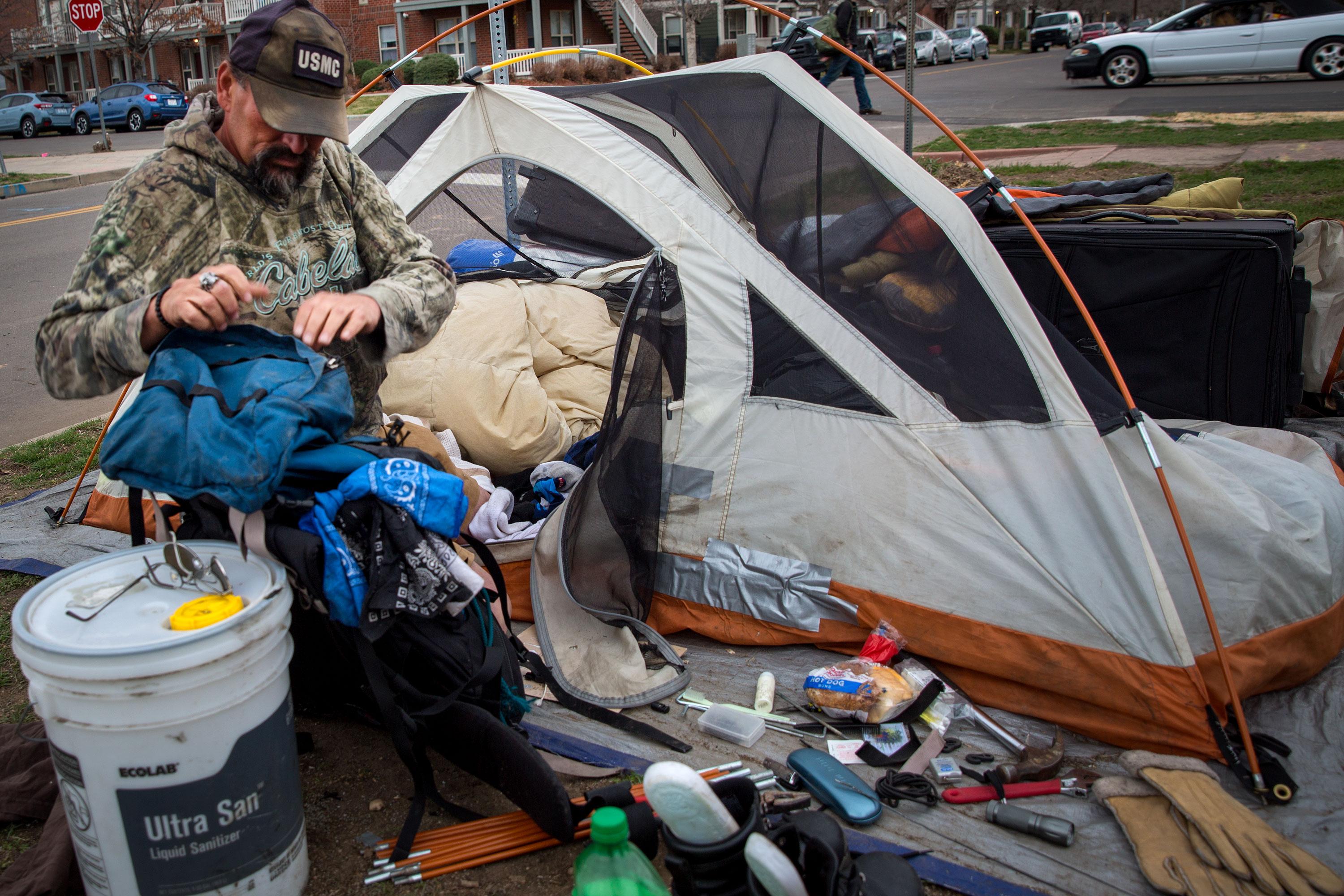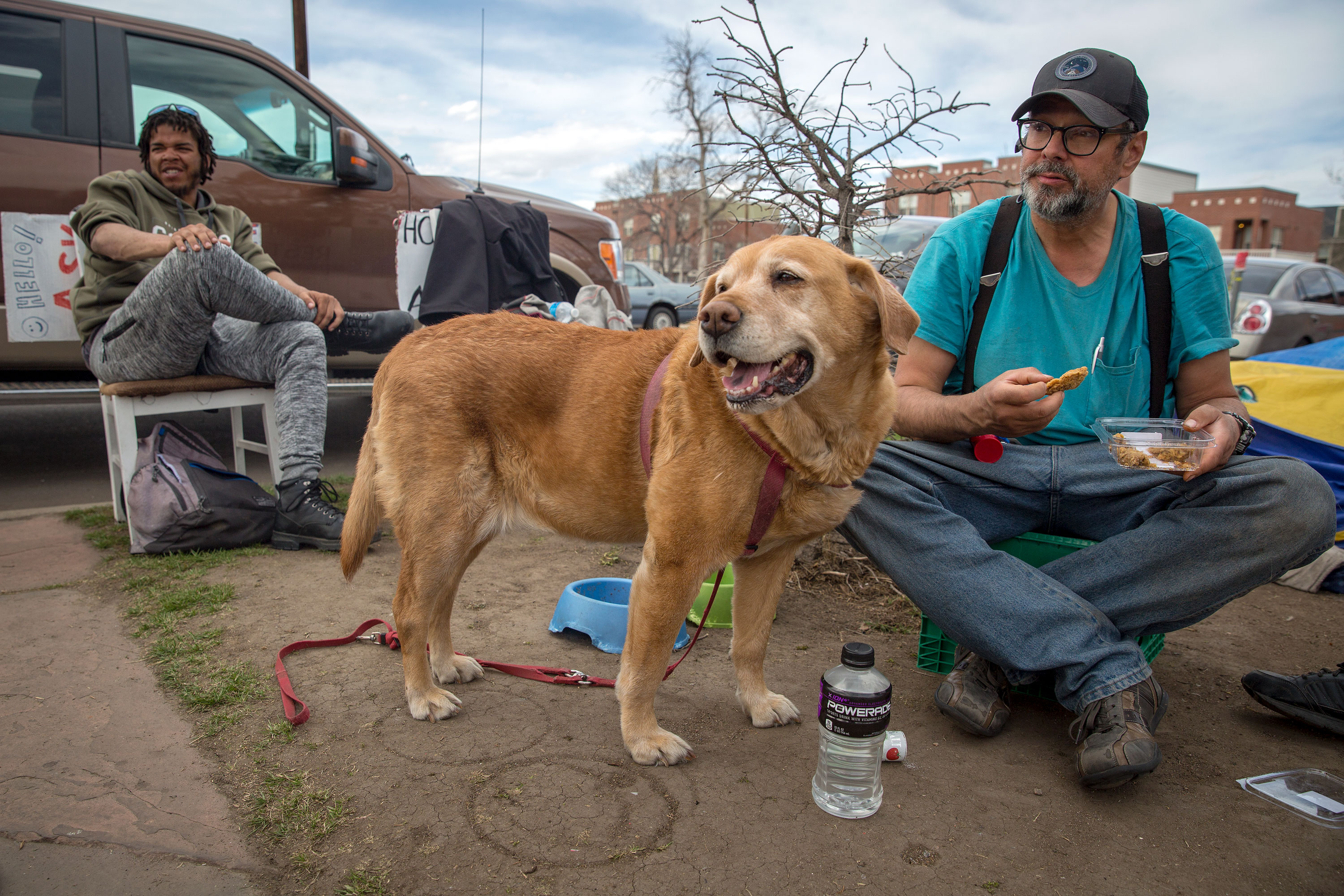

The tents that line the sidewalk at the corner of 27th Avenue and Arapahoe Street are the exact thing that Denver’s urban camping ban outlaws. The street camp has grown to around 22 people. Police have shown up to tell them they’ll have to soon move along.
The camping ordinance, approved by the city council in 2012, keeps a person living on the street from using “any tent, tarpaulin, lean-to, sleeping bag, bedroll, blankets, or any form of cover or protection from the elements other than clothing” as shelter.
Activists find the law cruel and have tried to overturn it. Now the issue will go to Denver voters. If the “Right to Survive” Initiative 300 passes, it would be unprecedented in the United States — no other city has codified a person’s right to live in public spaces
Christopher Zeno setup next to this empty lot in the Curtis Park Neighborhood just before March’s bomb cyclone snowstorm. Zeno shares his spot with his fiance said the two have tried to find shelter. Since they aren’t married, they couldn’t find a place where they could stay together. For safety, they don’t like to be apart.
“When you’re playing this game called cat and mouse with the police, getting swept, being pushed everywhere and whatnot, you’re getting no sleep,” Zeno said. “You’re not able to look for work, you’re not able to get things done. You’re not able to save money.”
Zeno’s experience on the street is what the “Right to Survive” Initiative 300 campaign wants to stop. Denver Homeless Out Loud formed out of the fight against the camping ban. When the city wouldn’t budge, activists got enough signatures to get their attempt to overturn the camping ban on the upcoming May ballot.

There are two things Denver Homeless Out Loud’s Terese Howard wants from this moment. First, she wants Denverites more involved in the issue of homelessness. And secondly, “to have the hope that the people of Denver will support our rights and will take that kind of stand.”
To Howard, it’s simple: People should be allowed to rest and take shelter in public spaces.
“Any place that people are currently trying to survive, that’s public space, is a place where people will continue to try to survive,” Howard said.
If Initiative 300 passes, Zeno’s camp along the sidewalks in Curtis Park would be legal. So would makeshift shelters next to the Platte River and tents and blankets in parks. Someone could legally live on the green space between a house or apartment complex and the street. If the area is open to the public, and the shelter doesn’t block walkways, a person could reside there.
It’s Howard’s hopes that if the city can’t hide homelessness it will be forced to make big changes.
“When people are seen, there isn’t this illusion that you can just push them out of homelessness,” Howard said.
Denver Homeless Out Loud surveyed more than 500 people who experience homelessness in the city. Due to the camping ban, many said they tend to use a more hidden, less safe sleeping spot to avoid police. Some said they won’t cover themselves even when it’s cold, so they won’t fit the definition of camping.
“These are all very unseen effects of this law,” Howard said. “It’s about police enforcement of visible poverty and using this pressure to push people around.”

Camping ban supporters argue it doesn’t do that. Police can only ticket or arrest an individual if they either refuse services or to move on. Chris Conner, the director of Denver’s Road Home, said the camping ban tries to create opportunities to help people.
“If we’re going to have interactions from the get-go through police, we need to challenge ourselves to make sure they’re as productive as possible,” Conner said.
That’s why police are sometimes paired with a behavioral health specialist when responding to situations on the street. The goal is to connect people to services and shelter, rather than a ticket or an arrest.
Connor believes if Initiative 300 passes, those interactions will be limited. One specific situation he worries about is that a person asleep on a park bench looks a lot like a person who has overdosed on a park bench. Drug overdoses are the top killer of people experiencing homelessness.
“So my main fear about the ‘Right to Survive’ initiative is that it may actually prevent needed lifesaving intervention,” he said.
Conor thinks that checking on the welfare of the person on the park bench could be considered “harassment” and that’s not allowed under Initiative 300. Therese Howard with Denver Homeless Out Loud insists the initiative wouldn’t get in the way of that kind of help.
The language of 300, however, is broad and open to interpretation.
Denver Assistant City Attorney, Melissa Drazen-Smith, said 300’s language is so general that she doesn’t know whether it will override other laws that might impact a person right to rest, like a park curfew. Instead, “a court is going to have to determine that,” she said.

“Together Denver” opposes Initiative 300 and have raised more than $1.5 million to fight it — nearly 20 times the amount that the “Right to Survive” people have raised, $79,189. Backers of Together Denver include the Downtown Denver Partnership, the Denver Chamber of Commerce and the Denver Metro Association of Realtors.
They all worry about the impact on the city’s open spaces, residential areas and business districts. Jeff Shoemaker is the executive director of the Greenway Foundation, which works to revitalize the South Platte River. He’s with Together Denver and fears Initiative 300 will hurt the environment.
“Understand, unchecked human waste every day,” Shoemaker said. “It is a river killer. It’s a park killer and it is a homeless abandonment nightmare.”
Together Denver argues Initiative 300 doesn’t help those who experience homelessness. They say it isn’t healthy or safe for people to sleep outside and the initiative would normalize the lifestyle. The Denver Homeless Leadership Council agrees. The group is made up of leaders from service organizations like the Colorado Coalition for the Homeless and the Denver Rescue Mission. They believe Initiative 300 could institutionalize encampments and street homelessness, so they won’t endorse it.
“I think those that vote for 300 don’t understand that it’s one of the most heartless and most damaging measures, whether it’s societal or environmental,” Shoemaker said.
Both sides agree that Initiative 300 is not a solution to homelessness. For the opposition, revoking the camping ban doesn’t move Denver any closer to getting people off the streets. Those that support 300 won’t argue that point but said the city hasn’t done enough for those already on the streets. They also contend the camping ban makes the situation worse. Whatever happens on May 7, both sides see that the bigger problem still needs to be solved.









